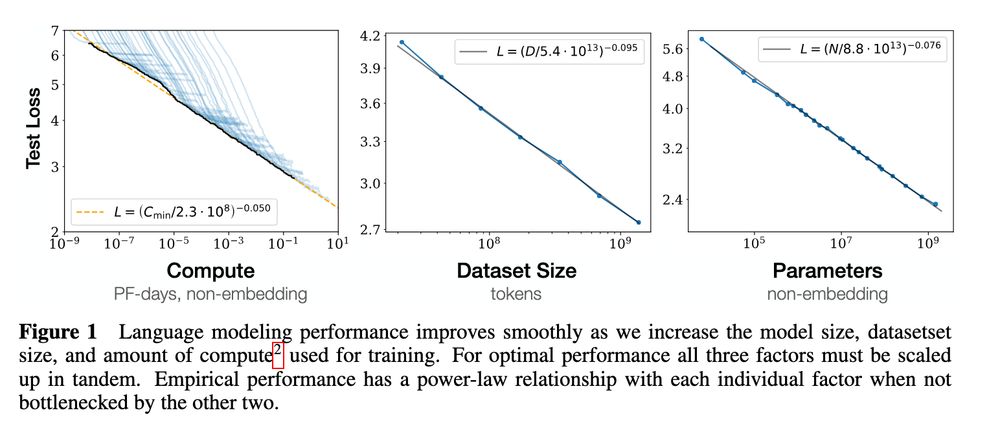
1/11 Excited to share our @Naturestudy led by @leonooi.bsky.social @csabaorban.bsky.social @shaoshiz.bsky.social
AI performance is known to scale with logarithm of sample size (Kaplan 2020), but in many domains, sample size can be # participants or # measurements...
doi.org/10.1038/s415...
17.07.2025 01:36 — 👍 172 🔁 82 💬 3 📌 16
Many cool results from this paper, including a multivariate twist of Simpson's paradox! Stronger salience FC at baseline predicts better cognition at baseline. Would children with larger salience FC increase also enjoy greater cognitive gains over time? Or is the reverse true??
11.06.2025 01:48 — 👍 19 🔁 5 💬 1 📌 0
Really appreciate it!Great to hear it sparked interest
08.06.2025 23:33 — 👍 1 🔁 0 💬 0 📌 0
Huge thanks to my amazing collaborators @bttyeo.bsky.social @shaoshiz.bsky.social @csabaorban.bsky.social @elvisha.bsky.social @avramholmes.bsky.social @lucinauddin.bsky.social @nichols.bsky.social and others not yet in Bluesky
Curious to dive deeper?
[Read the full paper: doi.org/10.1101/2025...
08.06.2025 15:09 — 👍 4 🔁 0 💬 0 📌 0
12/12 Simply put, development refines brain–cognition links as children enter adolescence, but who you are matters more than how much you change.
08.06.2025 15:04 — 👍 2 🔁 0 💬 1 📌 0
11/12 Together, our findings suggest that during early adolescence, stable individual differences in brain functional network organization shape future cognitive outcomes more strongly than short-term changes.
08.06.2025 15:03 — 👍 1 🔁 0 💬 1 📌 0
10/12 This reveals a multivariate twist on Simpson’s paradox: cross-sectional and longitudinal estimates of brain-cognition relationships can tell very different stories.
08.06.2025 15:03 — 👍 2 🔁 0 💬 1 📌 0

9/12 That task? The Little Man Task — a spatial reasoning measure — where FC change significantly predicted how much cognition changed over time.
Focusing on this task, we uncovered both converging and diverging predictive network patterns across models.
08.06.2025 15:02 — 👍 2 🔁 0 💬 1 📌 0

8/12 Surprisingly, across most cognitive tasks, neither baseline FC nor FC change predicted how much cognition changed over time.
That is, while we can predict who performs well at a later timepoint, it’s much harder to predict how much they improve over time – except for one task.
08.06.2025 15:01 — 👍 2 🔁 0 💬 1 📌 0

7/12 But even after controlling for reliability (e.g., by shortening the scan duration), baseline FC still outperformed longitudinal FC change in predictive power.
These results suggest that stable individual differences in baseline FC carry more predictive weight than short-term changes over time
08.06.2025 15:00 — 👍 3 🔁 0 💬 1 📌 0
6/12 Intriguingly, while FC change had some predictive value, baseline FC was a stronger predictor of future cognition.
Why might that be?
Could it just be a matter of measurement reliability?
Baseline FC: mean ICC = 0.56
FC change: mean ICC = 0.24
08.06.2025 14:59 — 👍 2 🔁 0 💬 1 📌 0

5/12 Building on this, we found that baseline FC better predicted future cognition than current cognition.
Models trained on baseline FC to predict baseline cognition generalized better when tested on Year 2 FC and cognition.
This suggests that brain–cognition relationships strengthen over time.
08.06.2025 14:58 — 👍 2 🔁 0 💬 1 📌 0

4/12 Both group-level longitudinal change and individual-level stability in functional connectivity (FC) are organized along the sensory–association (S-A) axis.
We also observed notable individual differences in FC change, especially in somatomotor, visual, and medial prefrontal cortex
08.06.2025 14:56 — 👍 2 🔁 0 💬 1 📌 0

3/12 Despite clear group-level gains in cognitive performance over two years, individual differences remained highly stable from baseline to Year 2.
At the same time, we observed substantial variation in how much cognition changed across individuals.
08.06.2025 14:56 — 👍 3 🔁 0 💬 1 📌 0
2/12 To test this, we analyzed longitudinal fMRI and cognitive data at baseline and Year 2 in ~3,000 individuals (ages 8.9–13.5) from the ABCD Study, spanning the transition from childhood to adolescence.
08.06.2025 14:55 — 👍 2 🔁 0 💬 1 📌 0

1/12 Cross-sectional studies offer only a single snapshot of brain–cognition relationships, missing the dynamic changes that longitudinal designs can reveal.
We hypothesize that cross-sectional and longitudinal estimates may diverge, echoing classical Simpson’s paradox.
See below:
08.06.2025 14:54 — 👍 4 🔁 0 💬 1 📌 0
Lab website: https://holmeslab.rutgers.edu/
Professor, Semel Institute for Neuroscience and Behavior, UCLA (https://profiles.ucla.edu/lucina.uddin)
Director, Brain Connectivity and Cognition Lab (https://teams.semel.ucla.edu/bccl)
Available for academic career advice. I never said *good* advice.
Professor of Neuroimaging Statistics
Oxford Big Data Institute
Nuffield Department of Population Health
University of Oxford
Assistant Professor at Northwell
Previously McGill, Cornell, Yale
Brain-Based Predictive Modeling Lab: bpmlab.org
Interested in sex, gender, brain, behavior, mental health, neurodevelopment, and machine learning
Views are mine
🧠🇨🇦🇳🇵
neuroscience, physiology, resting state fMRI
neuroscience, computational models | Computational Brain Imaging Group | Huge fan of Metroidvania and Edward Hopper.
Brain imaging, machine learning, neuroscience, mental disorders
https://sites.google.com/view/yeolab
official Bluesky account (check username👆)
Bugs, feature requests, feedback: support@bsky.app








